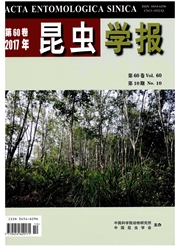

 中文摘要:
中文摘要:
【目的】为了阐明以冷冻保存家蝇Musca domestica蛹为寄主对繁殖蝇蛹俑小蜂Spalangia endius的影响。【方法】本研究分别利用新鲜和-20℃冷冻保存的家蝇蛹为寄主,记录了小蜂日存活数、日后代数量和性别等,并分别构建了实验种群生命表,分析比较了两种类型家蝇蛹对小蜂寄生率、日后代数量和性比、生命表参数等的影响。【结果】与新鲜家蝇蛹为寄主时相比,小蜂在以冷冻蛹为寄主时寄生率、后代数量和雄性百分比均较低(P〈0.01),成蜂寿命和产卵期差异不大(P〉0.05)。在以新鲜和冷冻家蝇蛹为寄主时,小蜂寄生率和后代数量均随日龄的增加而显著降低(P〈0.01);以新鲜和冷冻家蝇蛹为寄主时小蜂的净生殖率(R0)分别为34.91和20.16,种群内禀增长率(rm)分别为0.17和0.11,均以寄生新鲜家蝇蛹时较大(P〈0.01);在以冷冻家蝇蛹为寄主时,世代时间和种群倍增时间较以新鲜家蝇蛹为寄主时有所延长(P〈0.01)。【结论】蝇蛹俑小蜂可以利用冷冻家蝇蛹为寄主完成生活史;在规模化繁殖蝇蛹俑小蜂时,使用冷冻方式保存家蝇蛹的方法具有重要价值。
 英文摘要:
英文摘要:
[ Aim ] This study aims to illustrate the effects of using frozen-preserved housefly (Musca domestica) pupae as hosts on the reproduction of Spalangia endius. [ Methods ] The survival number, offspring number and sexes of S. endius on fresh housefly pupae and the housefly pupae frozen killed and preserved at -20℃, respectively, were recorded daily, and the life tables were built. The effects of host types on the parasitism rate, offspring number and sex ratio, and parameters of life table were compared and analyzed. [ Results ] The results showed that the parasitism rate, offspring number, and male proportion of S. endius on the frozen-killed housefly pupae were lower than those of wasps on the fresh housefly pupae (P 〈 0.01 ). The longevity and oviposition duration of adults were similar between the two groups (P 〉 0.05 ). The parasitism rate and offspring number in both groups decreased with the increasing of female age (P 〈 0.01 ). The net reproductive rate (R0) of S. endius on the fresh housefly pupae and frozen-killed pupae was 34.91 and 20. 16, and their intrinsic natural increase (rm) was 0. 17 and 0. 11, respectively. R0and rm were both larger on the fresh housefly pupae than on frozen-killed housefly pupae (P 〈0.01). The mean generation time (T) and doubling time (DT) of S. endius on the frozen-killed housefly pupae were prolonged compared with those of wasps on the fresh pupae (P 〈 0.01 ). [ Conclusion ] Our results indicate that S. endius can use frozen-killed housefly pupae as hosts to finish life history. We believe that the method of frozen-killed hosts would be useful for massively culturing of S. endius.
 同期刊论文项目
同期刊论文项目
 同项目期刊论文
同项目期刊论文
 Isolation and characterization of polymorphic microsatellite loci for Pachycrepoideus vindemmiae (Ro
Isolation and characterization of polymorphic microsatellite loci for Pachycrepoideus vindemmiae (Ro Effects of female diet and age on offspring sex ratio of the solitary parasitoid Pachycrepoideus vin
Effects of female diet and age on offspring sex ratio of the solitary parasitoid Pachycrepoideus vin Hyperparasitism in a Generalist Ectoparasitic Pupal Parasitoid, Pachycrepoideus vindemmiae (Hymenopt
Hyperparasitism in a Generalist Ectoparasitic Pupal Parasitoid, Pachycrepoideus vindemmiae (Hymenopt 期刊信息
期刊信息
